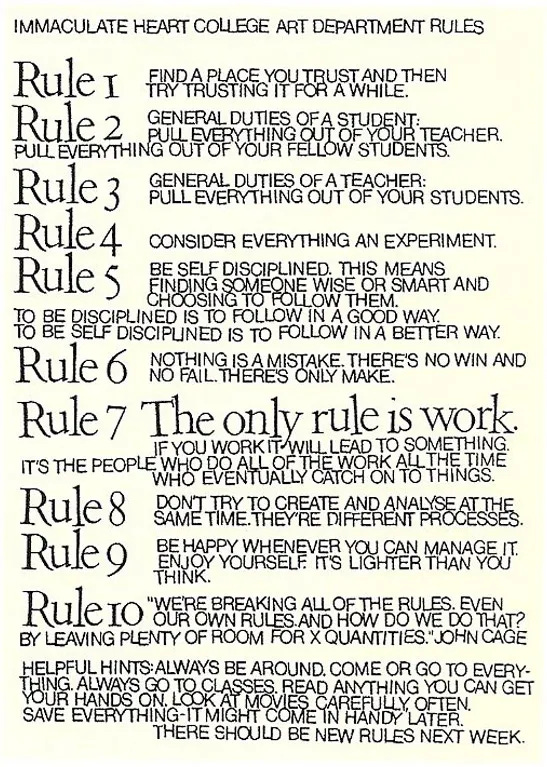Ten rules on the art of care
after Sister Corita Kent's "ten rules" for the Immaculate Heart College art department (and inspired by Elissa Strauss)
Pay exquisite attention. Less to what they say, though if this is available to you, wonderful. More to what their energy teaches you about what makes them feel fed, depleted and deflated, seen, celebrated, safe. In order to pay attention in this way, you will need to put down your phone and fall out of love with multitasking at least some of the time.
The attention will offer you a pattern. If you witness them over time in a million tiny, dumb, sacred moments, and this is in the art form, then you will see a pattern emerge over time. The pattern will change, so you can not become attached to it, but while it is intact, it becomes the sheet music for your understanding and your offerings, your toast with the crust cut off and your touch, your library book finds and your comforting silences. Patterns of care are a rhythm of energy and offerings. It is pattern keeping, not problem solving, that is the real basic unit of artful caregiving. “Consider everything an experiment.”
The pattern, honored, will lead to trust. When people feel that you have understood their musicality, even when they themselves can’t articulate what it is, their bodies relax around you. Even if they can’t remember your name, or speak at all, their bodies will remember that you are a gentle witness, a source of food and band-aids, a consistent force of nourishment, someone who doesn’t ask them to show up as anyone other than who they are.

Sister Mary Corita in front of her amazing art. Learn more about her here. The trust is deepened, not by perfection, but by a rejection of perfection altogether. A caretaker who is invested—not in her own ego affirmation or idealistic projections—but in the genuine and wholly unique needs and desires of her loved ones is the platonic ideal. But that’s not possible all the time. Of course your ego will get in the way. Your ideals and your projections will show up repeatedly and forever. It’s not the absence of them that will build trust; it is the refusal to pretend they don’t exist that will. The caretaker is not perfect. The person being cared for is not perfect. Start from there. When you get lost, go back there. And start again. “There’s no win and no fail.”
You will care for the human that needs to teach you something. “Pull everything out of each other.” You might see it as divine assignment. You might not. Whatever works for you to move with the challenge of caring for someone enigmatic, infuriating, unpredictable, someone who destroys all your well made plans, tests your patience, and brings you to your knees, surrendering to your truth that you don’t actually know how to care for this person. The not knowing is the divine part. When you surrender to your own limitations as a caregiver, which is to say, a person, you become primed for growth.
Care is a collaborative art. When you are on your knees, you pray to the god or goddess you believe in, or you call your brother, or you research respite day programs in your community. You don’t peel yourself off the floor and expect something to change without new hands, new ideas, new teachers, new landscapes. The art of care is constantly renewed, not just by the passage of time, but by the coordination of witnesses and workers.
When care is manual labor, scan for delight. There are seasons of this, mostly at the beginning and end of the life cycle—the wiping of asses, the cutting of toenails, the bathing and nursing and singing. It’s not a glamorous season. No matter. Turn towards delight instead of martyrdom, wherever you can find it. Channel your inner Mary Oliver, not your inner Mother Theresa. Which is to say, feel free to drink a lot of Diet Coke and smoke cigarettes and notice the bird outside your window if that gets you through.
If you are laughing, you are doing something right. The close cousin of delight—humor—must be your constant companion. Because in case you haven’t noticed, this life is absurd and so are all the people in it. When you care for them, when you really notice them, you can’t help but find yourself laughing your ass off. This is also divine. Why else would babies laugh so beautifully right from the start and elders lose almost everything but their humor in the end? “It’s lighter than you think.”
There is actually no binary in care. The caretaker is also taken care of by the touch, the slowing down, the sacred conversations tangled in messy sheets or while in a gas station bathroom, the feeling of such humane usefulness. And over time, the music shifts. The cared for often even becomes the designated caretaker. The daughter becomes the mother. The son becomes the father. The friend becomes the auntie. There are no fixed roles in the changing patterns of a life of care. The art and the artists evolve forever.
The ephemeral art of care is your legacy. No one will remember what you wore. Or even what you wrote, to be real honest. The money you made will feel complicated—whether it wasn’t enough or too much. But they will remember how you cared for them—your hands weaving their braid before bed, your kiss on their sweaty forehead, your voice lifted alongside theirs while you sing “Blackbird” in the car while driving along the Pacific Ocean and marveling at the sunshine. Even if your children grow long, spindly limbs and leave you in the dust, even if your father’s brain breaks and he grows ever quieter and sweeter, the care never dies. That’s your towering skyscraper, your giant abstract sculpture, your Nobel Peace Prize. Your grandest ambition will come true; at your funeral they’ll say, “She paid attention. She knew me. She laughed a lot and delighted in life, even when it was hard. She cared.” And that will be the whole damn thing.
“Always be around. There will be new rules next week…”




This entire piece is exquisite, Courtney. Printing it to keep in my journal and return to again and again... this all feels as true now with the teens and toddlers as it did when I was tending my mother in her last months... and it will be true again as my father moves into a new season and begins to list towards the nearest loving hand. Thank you for sharing. And yes to Mary Oliver over Mother Theresa.
Pay exquisite attention.
(Mantra for life.)
Thank you Courtney.